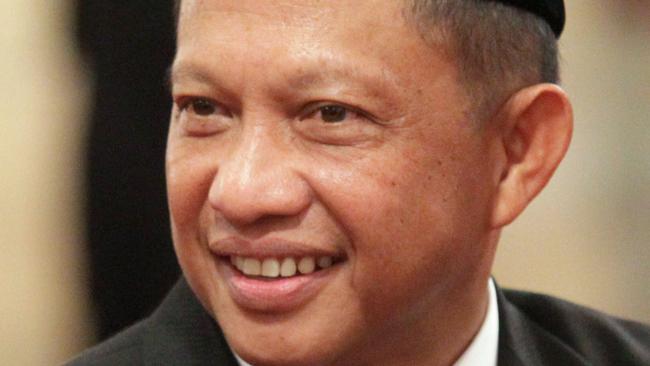Indonesian police chief Tito Karnavian vows to end repression
Tito Karnavian admitted public trust in the notorious Indonesian police force is at rock bottom.

Indonesia’s police chief has marked his first 100 days in office by admitting public trust in the nation’s notorious police force is at rock bottom, and vowing to end a culture of arrogance and repression.
The frank admission by Tito Karnavian — no secret to Indonesians who have long joked that the only police who can’t be bribed are polisi tidur (speed bumps) and statues — came at an extraordinary “morning coffee”, which was broadcast live on Facebook and involved a panel discussion with some of the most strident critics of police.
“This is by far the biggest and most far-reaching institution in Indonesia and yet public trust in us has continued to erode over the years,” the former counter-terrorism agency chief admitted yesterday as he unveiled an 11-point plan to restore public confidence and professionalism in the force.
Several recent surveys conducted before his appointment in July rated the police as the least trustworthy of all the nation’s institutions, he added.
“There’s still a lack of professionalism, security is very low in some areas, drugs are rampant, crime is rampant in some areas as well as the cultural aspect — excessive violence, arrogance and a culture of repression,’’ he said.
“We must change the culture of arrogance and be more responsive to what the public needs because the cost of low trust is very high. When people don’t trust their law enforcers we have riots, social conflicts.”
The Indonesian police, hived off from the military in 2000 as part of the post-Suharto-era reforms, has long been criticised by human rights groups for the widespread use of torture and endemic corruption and the fact police perpetrators are rarely brought to justice.
In 2012 Amnesty wrote an open letter to the Indonesian police force detailing numerous cases of serious human rights violations, including torture and deaths in custody, and calling for an end to the culture of impunity.
In 2014 Human Rights Watch reported a physical virginity test is routinely performed on female applicants to the police force. Human Rights Watch decried the practice as unscientific and degrading.
Earlier this year the National Human Rights Commission (Komnas HAM) revealed at least 121 people arrested in counter-terrorism operations alone had died in Indonesian police custody since 2007.
Al Araf, from Indonesia’s human rights monitor Imparsial, yesterday welcomed the plan but warned cultural change in the 130,000-strong force could take up to 40 years.
“Police everywhere are facing major challenges in the 21st century from cybercrime, terrorism, illegal arms deals. This is a burden for police all over the world, but it is even more complicated for countries that are shifting from military rule to civilian rule,” Mr Araf said.
Other human rights groups yesterday welcomed General Tito’s commitment to improving the police force but warned his goals could not be achieved while the institution protected law breakers within the force from criminal prosecution.
A feature of the 11-point plan to modernise the nation’s police force is a “reward and punishment” system, for those police who embrace the new culture, and those who refuse to change.
But when asked about one notorious case involving confessions of child abuse allegedly obtained under torture from five cleaners at the Jakarta Intercultural School — a sixth allegedly committed suicide in custody — he said internal investigations had already cleared the police.
General Tito was tapped for the top police job last July, just eight months after his previous appointment as head of the country’s National Counter-Terrorism Agency.
He previously headed Densus 88, the well-regarded and widely-feared counter-terrorism police force that was sponsored and trained by Australia and the US after the 2002 Bali bombings.
His latest appointment was widely seen as a win for President Joko Widodo against the old guard of his own party, the Indonesian Democratic Party of Struggle and its matriarch, Megawati Sukarnoputri, who backed a corruption-tainted deputy for the job.
He was later appointed as chief of Indonesian intelligence.



